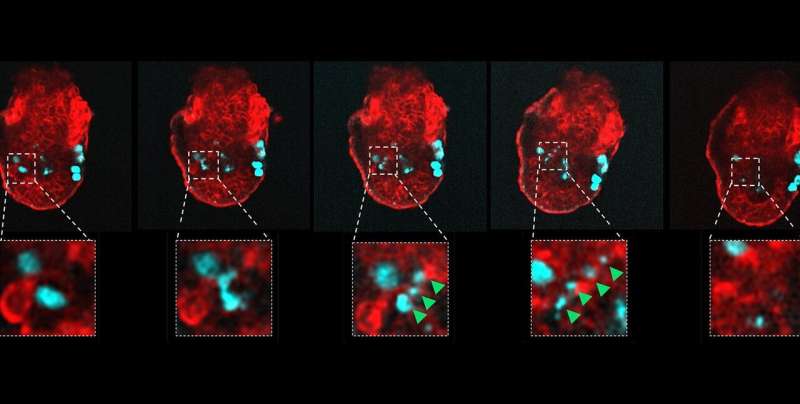How young embryos conduct quality control

The first few days of embryonic development are a critical point for determining the failure or success of a pregnancy. Because relatively few cells make up the embryo during this period, the health of each cell is vital to the health of the overall embryo. But often, these young cells have chromosomal aneuploidies—meaning, there are too many or too few chromosome copies in the cell. Aneuploid cells lead to the failure of the pregnancy, or cause developmental defects such as Down syndrome later in gestation.
Researchers have found that the prevalence of aneuploidy is drastically lower as the embryo grows and develops. Using mouse embryos, scientists from the laboratory of Magdalena Zernicka-Goetz, Caltech's Bren Professor of Biology and Biological Engineering, now show that this is because embryos are able to rid themselves of abnormal cells just before and soon after implantation into the uterus, thereby keeping the whole embryo healthy.
The research is described in a paper appearing in Nature Communications on June 11.
"It is remarkable that embryos can do this," says Zernicka-Goetz. "It reflects their plasticity that gives them the power to self-repair."
Zernicka-Goetz's team used an in vitro culture system to study mouse embryo implantation in a lab dish. They used mosaic epiblasts, which are embryos that have a mixture of healthy cells and aneuploid cells.
By making time-lapse movies of developing embryos, the team found that the embryo eliminates aneuploid cells, while healthy cells were found to simultaneously proliferate, in order to compensate for the loss of cells. In this way, the total size of the embryo remains unchanged from that of normal embryos.
The team found that aneuploid cells are under chronic stress due to an imbalance in the production of proteins caused by the abnormal number of chromosomes. This stress in turn activates a process called autophagy that leads to the death of the abnormal cells.
"This work brings us closer to understanding the first few days of our lives, and gives insight into the reasons behind the developmental defects and miscarriages that occur during early pregnancy," says Zernicka-Goetz. "Future studies in higher mammalian species are necessary to reveal if these mechanisms are found throughout mammals. I hope that our future studies at Caltech will lead us to understand the mechanisms behind this plasticity so we can restore it in adulthood to repair mature tissues and organs, when needed."
The paper is titled "Autophagy-mediated apoptosis eliminates aneuploid cells in a mouse model of chromosome mosaicism."
More information: Shruti Singla et al. Autophagy-mediated apoptosis eliminates aneuploid cells in a mouse model of chromosome mosaicism, Nature Communications (2020). DOI: 10.1038/s41467-020-16796-3
Journal information: Nature Communications
Provided by California Institute of Technology

















